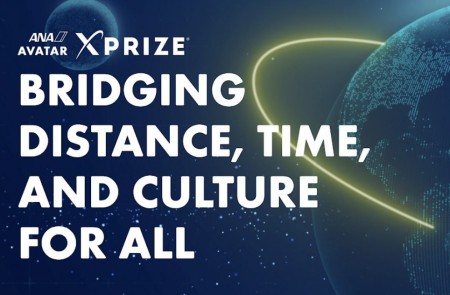Imaging the World One Photon at a Time
Abstract: The heart of a camera and one of the pillars for computer vision is the digital photodetector, a device that forms images by collecting billions of photons traveling through the physical world and into the lens of a camera. While the photodetectors used by cellphones or professional DSLR cameras are designed to aggregate as [...]
Carnegie Mellon University
Lesson Learned from Two Decades of Robotics Development and Thoughts on Where We Go from Here
Abstract: In this talk, Herman Herman will offer various lessons learned from developing various robots for the last 2 decades at the National Robotics Engineering Center. He will also offer his perspective on the future of autonomous robots in various industries, including self-driving cars, material handling and consumer robotics. Bio: Dr. Herman Herman is the [...]
ANA Avatar XPRIZE BRIDGING DISTANCE, TIME, AND CULTURE FOR ALL
"Calling all Carnegie Mellon inventors, creators, and scientists. Are you studying robotics, computer science, psychology, sociology, virtual immersion, sensor technologies, haptics, artificial intelligence or thinking about inventing the future? Have you ever wondered what it would be like to transport your consciousness to another part of the world, and be able to feel the place [...]
Factor Graphs for Robot Perception
Abstract: Factor graphs have become a popular tool for modeling robot perception problems. Not only can they model the bipartite relationship between sensor measurements and variables of interest for inference, but they have also been instrumental in devising novel inference algorithms that exploit the spatial and temporal structure inherent in these problems. I will overview [...]
Carnegie Mellon University
Scaling up Self-Supervision for Robot Learning
Abstract: A general purpose robot will need to interact with objects in cluttered environments with minimal supervision. Machine learning provides methods that can deal with these complex tasks without explicitly modelling the environment. More recently, deep learning techniques combined with large scale data has revolutionized the fields of computer vision, language processing and reinforcement learning. [...]
Towards better methods of video generation
Abstract: Learning to generate future frames of a video sequence is a challenging research problem with great relevance to reinforcement learning, planning and robotics. Existing approaches either fail to capture the full distribution of outcomes, or yield blurry generations, or both. In this talk I will address two important aspects of video generations: (i) what [...]
Carnegie Mellon University
Safe Data Gathering in Physical Spaces
Abstract: Reliable and efficient acquisition of data from physical spaces has widespread applications in industry, policy, defense, and humanitarian work. Unmanned Aerial Vehicles (UAVs) are an excellent choice for data gathering applications, due to their capability of gaining information at multiple scales. A robust data gathering system needs to reason about multi-resolution nature of information [...]
Robotics Institute Faculty Social
All Robotics Institute faculty are invited to attend these informal team-building business/social events. Beverages and snacks will be provided.
Light-Sensitive Displays
Abstract: Nobel prize winner M. G. Lippmann described his dream of an ideal display as a “window into the world.” “While the current most perfect photographic print only shows one aspect of reality, reduced to a single image fixed in a plane, the direct view of reality offers, as we know, infinitely more variety.” Changing [...]
Acquiring and Transferring Generalizable Vision-based Robot Skills
Abstract: In recent years, there have been great advances in policy learning for goal-oriented agents. However, there are still major challenges brought by real-world constraints for teaching highly generalizable and versatile robot policies in a cost efficient and safe manner. In this talk, I will argue that instead of aiming to teach large motion repertoires [...]









